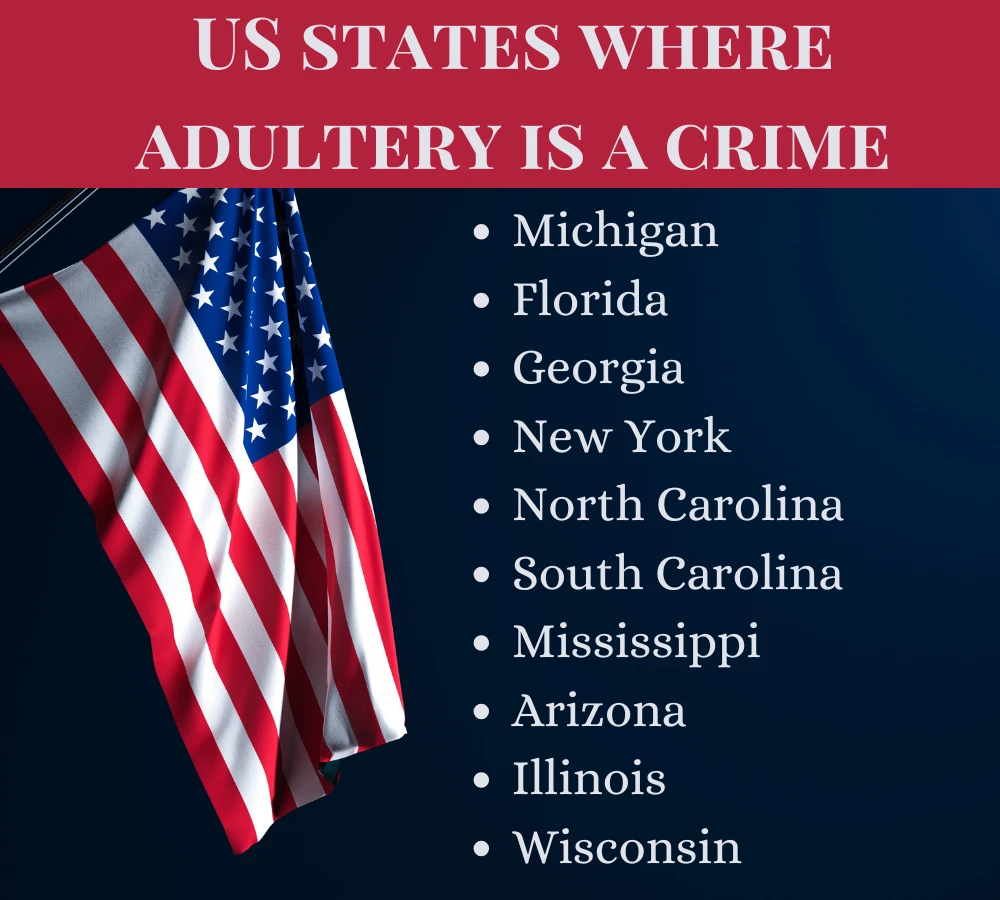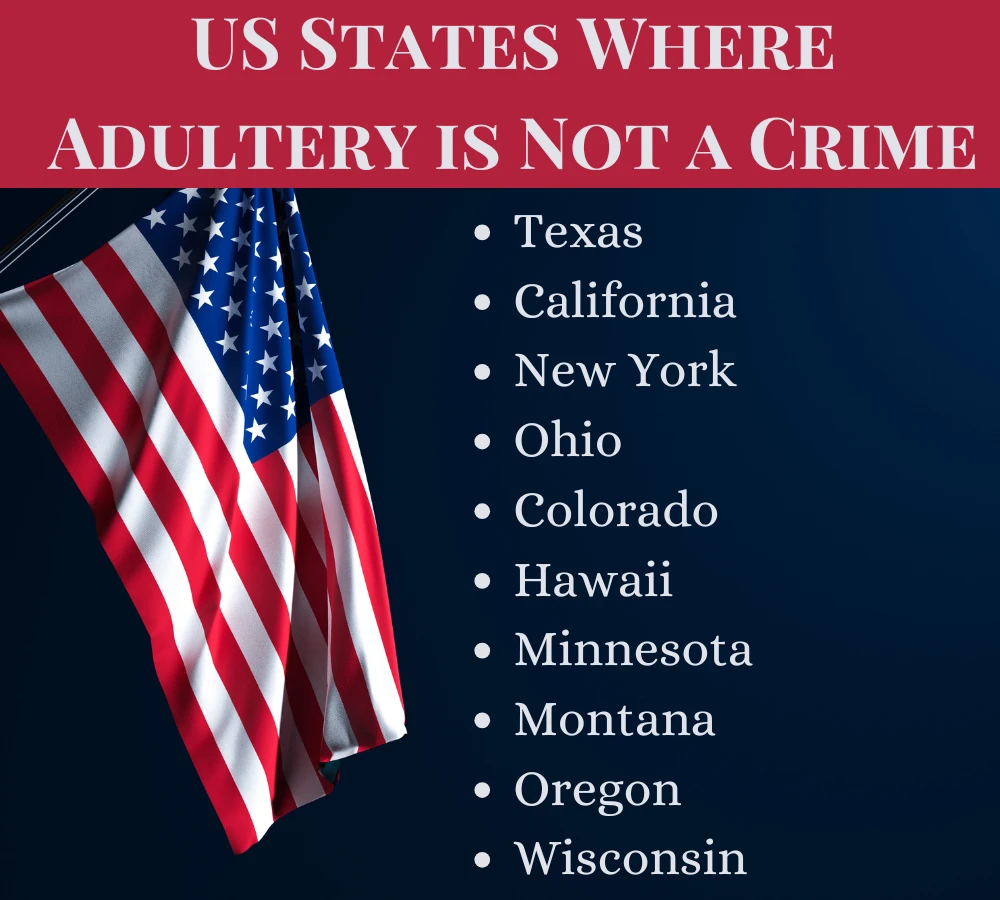Get California Online Divorce Forms for $299 – Limited Time Offer!

Share

Dina Haddad
Founder & Attorney Mediator
I’m Dina Haddad, a family law attorney-mediator in California. I’m so tired of couples not having a process that’s easy to complete their divorce. They are getting lost, wasting time and money, and beyond frustrated with their results.That’s why I created TheCompleteDivorce. I took my successful mediation practice and condensed it into an affordable and winning program.

Share

As a moral and intimate matter, there are strong opinions about adultery and depending on where you live in the US, you could face legal penalties.
Currently, there are 16 states in the United States that impose penalties for having extramarital relationships. Adultery laws have different regulations across all U.S. states.
A growing number of states have stopped making adultery a crime, including New York, which decriminalized it in 2024.
Those found guilty of adultery may face monetary or jail-based punishment under current state laws. Showing evidence such as photos, texts, or testimonies from witnesses is necessary to prove adultery.
Under the no-fault divorce system in California, adultery does not affect divorce settlement terms or affect alimony and child custody matters.
Seeking divorce in CA? ‘The Complete Divorce (TCD)’ is the best solution when it comes to online or DIY divorce in California. Visit TCD to Check your eligibility for free.
Key Takeaways
Adultery laws vary by state – Some states consider it a crime, while others ignore it.
Legal consequences exist but are rare – Fines, jail time, or divorce impacts in some states.
No-fault divorce states overlook adultery – Places like California & Texas don’t consider it in settlements.
Changing attitudes lessen enforcement – Many states decriminalized adultery due to privacy concerns.
By legal standards, a married person enters into a consensual sex relationship with someone who is not their spouse.
If a state has laws to make adultery illegal, the consequences vary from minor to more serious punishments.
Fornication refers to moral and religious rules about sex linked with single people who engage in sexual behavior.
States across the United States handle adultery differently since some view it as a punishable offense, but others don’t consider it a crime at all.
The laws against adultery impact different aspects of divorce, including support and child guardianship issues.
Certain states handle adulterous relationships as minor or major offenses that lead to court fines or prison sentences.
No-fault divorce states, like California, ignore evidence of partner infidelity during divorce hearings.
The United States government does not consider adultery a crime and in turn makes it a state issue. Currently, there are 16 states that punish adultery through monetary fines or prison sentences.
Even though authorities enforce these laws infrequently, they continue to exist officially on the books. And, although the U.S. government doesn’t punish adultery, there are penalties under the Uniform Code of Military Justice for the U.S. military, for such conduct.
Most states, including gCalifornia and Texas, follow no-fault divorce rules, which ignore whether marriage partners cheated on each other. In other words, adultery does not impact the results of property division, child custody, or child and spousal support.

The Federal Government allows 16 US states to punish people who commit adultery. Despite few actual arrests, these legal rules about adultery directly impact how family property is divided during divorce proceedings.
According to state laws, you can be charged with misdemeanor or felony status for adultery and face consequences such as monetary fines and prison sentences.
States that base divorce decisions on misconduct look at adultery to determine spousal payments and custody arrangements along with property splits. Check my work for information on this analysis. Few US states punish adultery as a crime, but more states use it to decide divorce issues.
States made adultery illegal to strengthen both marriage bonds and community organizations. Historically, adultery was wrong both morally and legally, and seen as an attack on the family.
Few courts have kept their adultery laws to determine court outcomes between married couples. Given the societal changes on the court’s input on private matters, those that have committed adultery face minimal risk of prosecution.
In states where adultery is a crime, the penalty is dependent on that specific state’s laws. For example, in Michigan, adultery qualifies as a felony, but Florida imposes a $500 fine on offenders.
In such states, having an extramarital affair can impact the divorce outcome, including how property and spousal support is handled during a divorce.
However, even in states that have adultery laws, the judge will not enforce them given the shift to keeping personal family issues out of the public domain.
Showing proof of adultery demands strong evidence because details about cheating are hard to find. Courts accept various types of evidence, including images, digital messages, phone data, and observer statements.
States have different rules about which kinds of evidence prove cohabitation or repeated acts can establish adultery.
Private investigators and specialists in digital evidence help gather evidence to show a partner’s adultery.
A divorce case based on fault needs substantial proof of adultery to affect who pays support money and receives child care while legal distribution occurs.
In states where adultery is not a crime, adultery is a private matter and there are no legal penalties. These states use no-fault divorce rules.
No-fault divorce means that the court does not assign blame or fault to either spouse as for the purposes of the divorce and, in return, the outcome of the divorce. The presence of adultery will not affect settlement terms during divorce.
The laws of these states handle divorce proceedings without considering marital misconduct. Legislation now defends individual privacy, which caused states to remove adultery regulations.
Despite previous laws against adultery, they are no longer enforced because of legal challenges and social changes.

Adultery causes major damage to relationships, which leads partners to file for divorce most frequently. After an affair, couples should seriously consider whether marriage therapy would be a fair option.
Sometimes, marriage counseling has already failed or the trust has been irreparably broken.
In considering whether to divorce or work on your marriage, there are several considerations, including money reliance, personal trauma, and children, that can play a role as to the success of a couple staying together after an affair.
In fault-based states, a person fined for adultery generally receives lower alimony. The court will assess adultery as marital wrongdoing to modify maintenance payments and property splits. Adultery does not influence how parents must pay for their children’s living costs.
Since California handles divorces using no-fault law, adultery does not affect property division, or spousal and child support payments.
The court will allow for the other spouse to be compensated for funds that were not used for the community benefit, such as to support an extramarital affair.
The court bases its child custody decisions only on what benefits the child the most rather than whether the parent cheated.
Depending on the state, adultery is either treated as a criminal offense or ignored. Whether an affair has an impact in your matter depends on where you live in the United States.
In California, a no-fault state, any separation agreement remains independent of marital unfaithfulness.
Start Running Your Divorce Process Now! Legal issues should not block your progress.
You can get your divorce through TCD’s online service, which provides convenient legal support at an affordable cost.
Michigan treats adultery as a major crime that brings jail sentences. States across the US define adultery as a misdemeanor offense subject to monetary penalties or probation.
Every state uses different punishments when enforcing these laws, which may include monetary fines, jail terms, or supervised release.
The laws in some areas about adultery affect both divorce payouts and alimony, while official prosecutions remain uncommon.
Adultery is illegal in those states, but police typically ignore such offenses. Each state typically chooses not to pursue adultery offenses.
Six states—North Carolina, Mississippi, South Dakota, New Mexico, Utah, and Hawaii—allow spouses to initiate legal action against the third party involved in an affair.